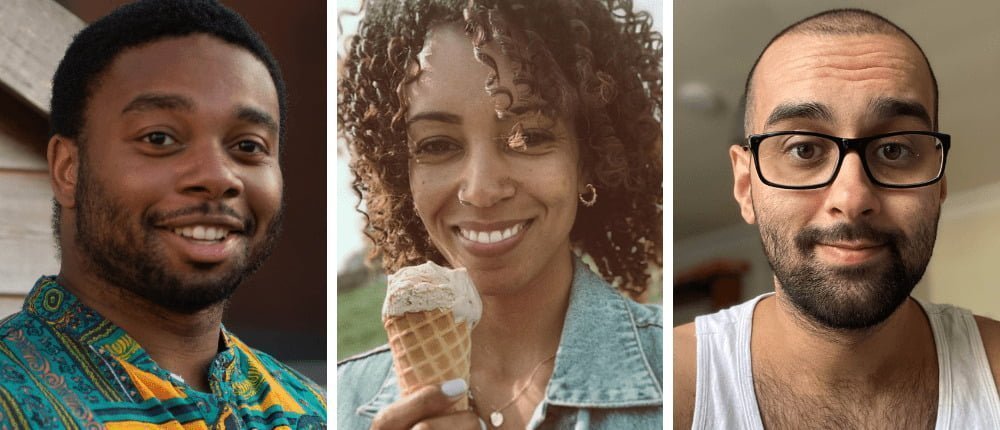
This website uses cookies to improve your experience. We'll assume you're ok with this, but you can opt-out if you wish. Read More
The Next Round: What happens after you change your drinking?

Our Black History Month podcast takeover continues. Guest podcast host Yasmin Spark says that this episode was a joy to record. That’s good to hear as our panelists, Bethany Irving, Michael Singh, and Rhondell Stabanna discuss discovering sober joy after changing their problem drinking habits. This cheerful episode features real-life stories from our panel of sober Instagrammers about their reasons for stopping drinking and the joy that they found in that process.
Bethany Irving is better known by her Instagram handle, @revived.and.sober. She is a mindset coach living in the Cotswolds with her husband and dog, Sophie. Bethany is currently 10 months sober and hasn’t looked back. For Beth, quitting alcohol was a much-needed lifestyle change. Bethany now lives an authentically happy life, not fuelled by fake highs and hungover lows. She feels that without alcohol, she is stronger than she has ever been.
Michael Singh is a self-confessed nerdy northerner living down in London. He has been sober for just over two years. He is known on Instagram as @sober_singhy. He’s an interesting mix of backgrounds with Belgian, English & Indian included. Michael spends most of his time doing hot yoga, playing football, and writing / drawing about mental health and sobriety. He’s a project manager by trade but spends a lot of time drawing pictures for charity, with £556 raised so far.
Rhondell Stabanna is one of the co-founders of YADA Collective CIC. It is a social enterprise with a vision of reimagining nightlife. YADA runs an alcohol-free bar in the heart of Derby city centre, but also has an amazing online store and mobile bar offer as well. Rhondell and the team recently started a project called Sober Black Britain which aims to highlight people of colour within the no and low space.
We’ve probably all suffered as a result of being a person of color, which needs to also be looked at because I think that those have massive impacts on why people drink. It’s like trying to not just fit in, but it’s trying to block out the things that may have been said to us over the years.
Michael Singh
We know that a one-size-fits-all approach to sobriety does not ‘fit all’. At Club Soda, we feel this from a queer perspective. Something important to note is that studies show that people of colour are less likely to access helpful services for mental health and addiction problems. Having adequate and appropriate representation in every community is necessary to make sure that everyone can access the help that they need. It also reduces the likelihood that people turn to drinking in times of turmoil and stress.
This website uses cookies to improve your experience. We'll assume you're ok with this, but you can opt-out if you wish. Read More
| Name | Domain | Purpose | Expiry | Type |
|---|---|---|---|---|
| wpl_user_preference | joinclubsoda.com | WP GDPR Cookie Consent Preferences. | 1 year | HTTP |
| PHPSESSID | www.tickettailor.com | PHP generic session cookie. | 55 years | HTTP |
| AWSALB | www.tickettailor.com | Amazon Web Services Load Balancer cookie. | 7 days | HTTP |
| YSC | youtube.com | YouTube session cookie. | 55 years | HTTP |
| Name | Domain | Purpose | Expiry | Type |
|---|---|---|---|---|
| VISITOR_INFO1_LIVE | youtube.com | YouTube cookie. | 6 months | HTTP |
| Name | Domain | Purpose | Expiry | Type |
|---|---|---|---|---|
| _ga | joinclubsoda.com | Google Universal Analytics long-time unique user tracking identifier. | 2 years | HTTP |
| sbjs_migrations | joinclubsoda.com | Sourcebuster tracking cookie | 55 years | HTTP |
| sbjs_current_add | joinclubsoda.com | Sourcebuster tracking cookie | 55 years | HTTP |
| sbjs_first_add | joinclubsoda.com | Sourcebuster tracking cookie | 55 years | HTTP |
| sbjs_current | joinclubsoda.com | Sourcebuster tracking cookie | 55 years | HTTP |
| sbjs_first | joinclubsoda.com | Sourcebuster tracking cookie | 55 years | HTTP |
| sbjs_udata | joinclubsoda.com | Sourcebuster tracking cookie | 55 years | HTTP |
| sbjs_session | joinclubsoda.com | SourceBuster Tracking session | Session | HTTP |
| Name | Domain | Purpose | Expiry | Type |
|---|---|---|---|---|
| mailchimp_landing_site | joinclubsoda.com | Mailchimp functional cookie | 28 days | HTTP |
| __cf_bm | tickettailor.com | Generic CloudFlare functional cookie. | Session | HTTP |
| NID | google.com | Google unique id for preferences. | 6 months | HTTP |
| Name | Domain | Purpose | Expiry | Type |
|---|---|---|---|---|
| _ga_10XZMT03ZM | joinclubsoda.com | --- | 2 years | --- |
| AWSALBCORS | www.tickettailor.com | --- | 7 days | --- |
| cf_clearance | tickettailor.com | --- | 1 year | --- |
| VISITOR_PRIVACY_METADATA | youtube.com | --- | 6 months | --- |
Join Club Soda for 10% off your first order of drinks for UK delivery. Plus get our latest news and special offers for members to choose better drinks, change your drinking and connect with others.
If you get an error message with this form, you can also sign up at eepurl.com/dl5hPn